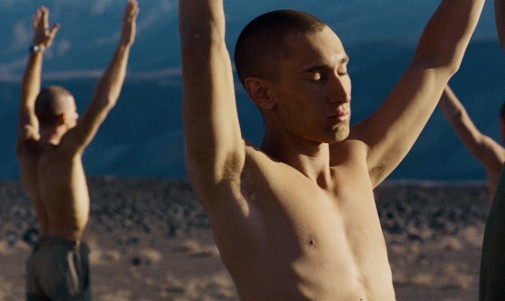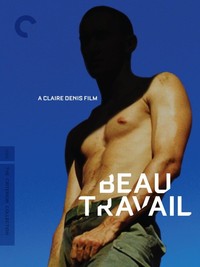How Had I Never Seen... "Beau Travail"?
 Sunday, November 29, 2020 at 10:01PM
Sunday, November 29, 2020 at 10:01PM People cope with stress in different ways. Earlier this month, when the US presidential election was unfolding and the world held its breath, I turned to Twitter to reminisce about 2020 cinematic excellence and try to calm my nerves. I also scoured the internet for good deals on physical media, a bit of retail therapy, adding more DVDs and Blu-Rays to a collection that has long ago surpassed a thousand films. Part of the new additions were my first ever Criterion editions!
All this to say that the discs arrived this week and, since the Criterion Channel has a new collection of Claire Denis films, I decided to finally watch the much-lauded Beau Travail and write about the experience. And what an experience it was…

Some films intimidate with their greatness. Beau Travail, Claire Denis' 1999 masterpiece is one of those. I confess myself cowered by the picture, so enthralled by its spell that I feel like any words I write will only diminish the piece's mastery and reflect poorly on my skills. Having never read Melville's Billy Budd, from which Beau Travail is freely adapted, I also consider myself unqualified to delve into the complexities of its text, no matter how much Denis is seemingly bored by narrative and actively hostile towards textual structures. Still, there's nothing like a challenge and it's healthy to be humbled by failure.

Beau Travail starts with a tracking shot, a look at a bellicose mural. It starts with horizontal motion and a playful kiss. War and seduction, violence and desire, masculine figures and a feminine look, they all dance on-screen, and Denis both invites us to join in and signals for distance. It's a push and a pull, a game that results as often in pleasure as it does in despair. The setting is Djibouti, an East African nation that shares borders with Somalia, Ethiopia, and Eritrea. Its landscapes are often arid, white sand, salt, and rock as far as the eye can see, its coastlines bathed by the blue waters of the Red Sea.

Ghosts of European colonialism haunt the land in the form of the French Foreign Legion. It's among these military men that Beau Travail finds its milieu, the camera lustily observing their bodies as if they were natural monuments erected from the earth, mountains of sinewy hot flesh. The bronzed legionnaires pose under the harsh sun as if Greek statues were given a kiss of life. While they do this, a sailor's chorus intones a song from Britten's Melvillian opera, a gravelly rumble that makes calisthenics appear like some ancient ritual, an old religious tradition lost to time.
The film too feels like something much older than its 21 years of age, perhaps because it's framed as a remembrance. The audiovisual language devised by Denis, cinematographer Agnès Godard, editor Nelly Quettier, and their balletic cast, hints at some primordial power beyond simple memory, though. Film language is thus purified, denuded of excess ornamentation, including the traditional tenets of storytelling. It's clichéd to say such things, but Beau Travail truly is a film one must feel instead of merely watching. Heed the picture's primitive call to a spectator's abandonment and surrender yourself to it.

Feel the tale of Denis Lavant's Galoup and Michel Subor's Forestier who want Grégoire Colin's beautiful Sentain in a setting where the queerness of a man's want of another man must be hidden, buried. It runs through the cast of lustful males like a subterranean river. Repressed emotion curses through the body that performs masculinity, unnerves the muscle mass, and trembles the bone. Unmoving motion is the paradox such repression produces, a time bomb ready to detonate at any given moment, a promise of violence. Even when that promised isn't fulfilled, the advent of doom is unavoidable.

Or is it? Do Galoup and Forestier truly partake in homoerotic longing or is it something else? Is it envy soured into rage? Is it the camera who desires instead of the men? Maybe the desire at play isn't as sensuous as the images suggest, but the tension in the military order of the legionnaire. Those who live to fight but have no combat to enjoy are obsolete things, purposeless figures in perpetual wandering. Such tensions also manifest in the men's out-of-place existence in the African environment. They don't belong. It's the Djibouti women in colorful garb, including Galoup's supposed lover, who can call this place their home and not taste the foul flavor of a lie.
Whether it is the way of the flesh or the desire for a purposeful fight, the legionnaires' wanton existentialism suffuses Beau Travail. Pardon the potential crudeness, but it's a horny picture, Male beauty is extensively celebrated as much as it's dissected by the camera's curiosity, the men's viciousness, the wispy phantasmagoria of referenced texts – an unread novella, an opera, a history. All this coalesces and crashes down in Beau Travail's formidable ending. The battle-less battlefield is left behind as is the blinding sun, the camera finding its place in a discotheque that glistens like a black diamond. Then does the bomb of repression explode, not with maimed bodies but with dance, a glorious frenetic dance that takes your breath away.

Have my words captured the gem-like sublimity of Beau Travail, its genius, its miraculous nature? No, and I doubt I'll ever be able to put such things into writing. Nonetheless, one hopes they have elicited some curiosity in those who haven't yet watched Beau Travail and perchance invoked the ghost of a smile in the people who have long loved the film. Watching this was a revelation, an epiphany, an orgasm, an explosion of euphoria that rekindled the lively flame of cinephiliac devotion. Bowing at the altar of Denis, one convulses with joy, lust, pure ecstasy and rolls on the floor to the sound of the rhythm of the night.
Beau Travail is streaming on the Criterion Channel as are many of Claire Denis' features. Don't miss the opportunity to see this exquisitely restored masterpiece.




Reader Comments (11)
One of the greatest endings of all time.
I really don't think you need to read BILLY BUDD to understand BEAU TRAVAIL. People certainly "get" VERTIGO who have never read D'ENTRE LES MORTS. If you liked this film I'd suggest the criminally underrated TROUBLE EVERY DAY as well as CHOLOLAT and I CAN'T SLEEP, probably in that order. She's certainly a major figure and deserves film lovers' highest respect.
8/10 movie with a 1982462947/10 ending. Maybe my favorite ending of all time??
I think this one has to be seen on the big screen. I’m so sad to say I struggled with it a bit. It’s gorgeous for sure but I didn’t connect with it at all...
Just bought the Criterion Blu-ray (along w/ White Material’s) and could not be more excited to revisit both. Beau Travail is pure cinema, without question. I’d say familiarity with the source material brings Claire Denis’s storytelling techniques into sharper relief, but it’s not necessary to appreciate this masterwork. I’d also second the recommendation for Trouble Every Day. What a mesmerizing take on the horror genre.
JJ -- the ending really is incredible. I remember being so swept away by this in cinemas. It made my top ten list in 2000 (when it was released in the US)
Co-sign on the ending. The movie is very good, but I wasn't much enamored with it until I heard "This is the rhythm of the night!"
The rest, as they say, was absolute queer heaven.
Props to Denis for quietly sneaking in the thesis to her film in a sequence that comes at the very end and, almost literally, out of nowhere.
I have this film as one of 12 (one of them is a trilogy) as a Blind Spot for the next year as a quarter of my picks are films directed by women. I really want to see this.
Status for Whatsapp, FB at statussove.com visit
Nice Article Hear is all types of status quotes images are there are there visit Silence Quotes for more quotes on. 101+ Best Misunderstanding Quotes For You
This is such a great post! It’s the little things in life that mean the most and make up the larger moments in our lives! basketball legends